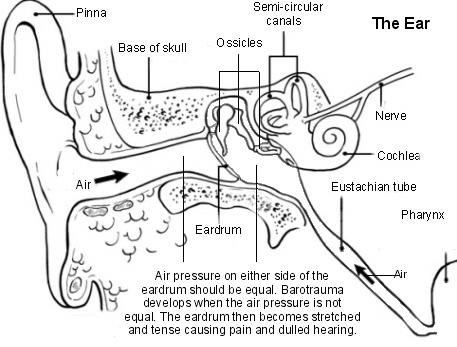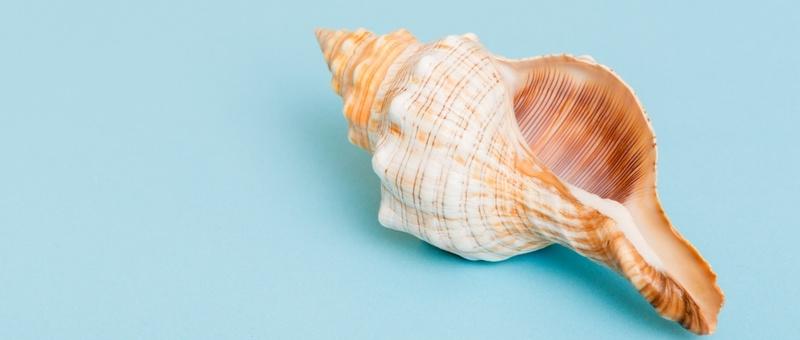Barotrauma to the ear
Stretched eardrum
Peer reviewed by Dr Toni Hazell, MRCGPLast updated by Dr Hayley Willacy, FRCGP Last updated 30 Jun 2022
Meets Patient’s editorial guidelines
- DownloadDownload
- Share
- Language
- Discussion
In this series:EaracheEustachian tube dysfunctionMiddle ear infection (otitis media)Outer ear infection (otitis externa)Fungal ear infectionBoil in the ear canal
Barotrauma to the ear occurs when the eardrum becomes stretched and tense. It causes ear pain and dulled hearing. It is due to unequal pressures that develop either side of the eardrum. This most commonly occurs when descending to land in a plane and is also experienced by scuba divers.
In this article:
Video picks for Earache
What is barotrauma?
What is barotrauma?
Barotrauma means damage to ear tissues caused by a difference in pressure between air spaces inside the body.
Barotrauma to the ear is the most common type of barotrauma. It is where you have ear pain and dulled hearing because of unequal pressure that develops between the air in the middle ear and the air outside the ear.
What causes barotrauma?
Back to contentsThe small space in the middle ear behind the eardrum should normally be filled with air. This air space is connected to the back of the nose by a tiny channel called the Eustachian tube. The air on either side of the eardrum should be at the same pressure for the eardrum to vibrate and function normally.
Ear barotrauma

If the air pressure outside the ear increases quickly this pushes the eardrum inwards, which can be painful. The tensed eardrum also cannot vibrate as well as it should and so you may also have some temporary hearing loss. To relieve the pressure on the tensed eardrum, the air pressure inthe middle ear has to rise quickly too. Air needs to travel up the Eustachian tube into the middle ear to equalise the pressure.
The most common example of barotrauma affects some air travellers. As a plane descends to land, the air pressure becomes higher. This pushes the eardrum inwards. If the pressure inside the middle ear is not equalised quickly then you can get ear pain. Other situations where air pressure may quickly rise outside the ear are during scuba diving, diving to the bottom of a swimming pool, or rapidly descending in a lift (elevator).
Continue reading below
Why are some people affected more than others?
Back to contentsThe Eustachian tube is normally closed but opens from time to time when we swallow, yawn or chew. So, in most people, normal swallowing and chewing allow air to flow up or down the Eustachian tube to equalise the air pressure quickly on either side of the eardrum.
However, the Eustachian tube in some people does not open as easily and so the pressure may not be equalised so quickly. For example, some people may have a more narrow Eustachian tube than normal. Also, if you have any condition that causes a blockage to the Eustachian tube then the air cannot travel up or down.
The common cause of a blocked Eustachian tube is mucus and inflammation that occur with colds, throat infections, hay fever, etc. Any condition causing extra mucus in the back of the nose can cause this problem.
How can I prevent ear pain when flying?
Back to contentsIdeally, anyone with a cold, respiratory infection, ear infection, or medical condition affecting the middle ear should not fly in a plane . However, not many people will cancel their holiday trips for this reason. The following may help people prevent ear barotrauma pain when flying:
Suck sweets when the plane begins to descend. Air is more likely to flow up the Eustachian tube if you swallow, yawn or chew. For babies, it is a good idea to feed them or give them a drink at the time of descent to encourage them to swallow.
Take a deep breath in. Then, try to breathe out gently with your mouth closed and pinching your nose. In this way, no air is blown out but you are gently pushing air into the Eustachian tube. If you do this you may feel your ears go 'pop' as air is pushed into the middle ear. This often cures the problem. Repeat this every few minutes until landing - whenever you feel any discomfort in the ear.
Do not sleep when the plane is descending to land. (Ask the air steward to wake you when the plane starts to descend.) If you are awake you can make sure that you suck and swallow to encourage air to get into the middle ear.
The above usually works for most people. However, if you are particularly prone to develop 'aeroplane ear', you may wish to also consider the following in addition to the tips above:
A decongestant nasal spray can dry up the mucus in the nose. For example, one containing xylometazoline - available at pharmacies. Spray the nose about one hour before the expected time of descent. Spray again five minutes later. Then spray every 20 minutes until landing. Decongestants are not suitable for young children.
Air pressure-regulating ear plugs. These are cheap, reusable ear plugs that are often sold at airports and in many pharmacies. These ear plugs may help slow the rate of air pressure change on the eardrum. It is not yet known how effective they are but some people find them helpful.
See the separate leaflet called Ears and flying for more options and more details.
Continue reading below
What about divers' ear?
Back to contentsNormal practice of divers is to descend and ascend slowly which should give them time to equalise the air pressure on either side of the eardrum. Divers can do the Valsalva manoeuvre (described above) too. You should not dive if you have a condition that may cause a blocked Eustachian tube, as this may cause severe barotrauma and severe ear pain.
Are there any complications?
Back to contentsEar pain can be severe but in most cases no serious damage is done to the ear. Occasionally, the eardrum will tear (perforate). However, if this occurs, the eardrum is likely to heal by itself, without any treatment, within several weeks. See the separate leaflet called Perforated eardrum for more details.
Patient picks for Earache
%2Fog.png&w=1600&q=75)
Ear, nose and throat
Middle ear infection (otitis media)
Ear infection is very common in children although it can occur in people of any age. The main symptoms are earache and feeling unwell. Painkillers are the main treatment. Antibiotics are not usually helpful but are prescribed in some cases. The infection usually clears within a few days.
by Dr Philippa Vincent, MRCGP

Ear, nose and throat
Earache
Earache, or pain in the ear, is very common. It is particularly common in children. There are many causes of earache but the most common cause is infection. This often clears up on its own without any treatment. However, if it is not getting better or if there are other more serious symptoms, clinical help might be needed The ear is involved in hearing and balance. So, problems with the ear may cause other symptoms such as loss of hearing, dizziness or a ringing in the ear. This leaflet provides an overview of some of the more common problems related to the ears. It will direct you towards leaflets with more detailed information on the individual conditions.
by Dr Philippa Vincent, MRCGP
Further reading and references
- Jumah MD, Schlachta M, Hoelzl M, et al; Pressure regulating ear plug testing in a pressure chamber. Aviat Space Environ Med. 2010 Jun;81(6):560-5.
- Cabin air pressure; International travel and health, World Health Organization (WHO)
- Barotrauma; American Hearing Research Foundation
- Lindfors OH, Raisanen-Sokolowski AK, Suvilehto J, et al; Middle ear barotrauma in diving. Diving Hyperb Med. 2021 Mar 31;51(1):44-52. doi: 10.28920/dhm51.1.44-52.
Continue reading below
Article history
The information on this page is written and peer reviewed by qualified clinicians.
Next review due: 29 Jun 2027
30 Jun 2022 | Latest version

Ask, share, connect.
Browse discussions, ask questions, and share experiences across hundreds of health topics.

Feeling unwell?
Assess your symptoms online for free
Sign up to the Patient newsletter
Your weekly dose of clear, trustworthy health advice - written to help you feel informed, confident and in control.
By subscribing you accept our Privacy Policy. You can unsubscribe at any time. We never sell your data.